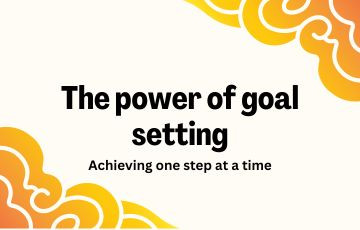
Goal setting is not just a simple task; it's a fundamental principle that drives success in various aspects of life. Whether it's personal growth, career advancement, or health and fitness, setting specific, measurable, achievable, relevant, and time-bound (SMART) goals can significantly enhance motivation and productivity.
Setting goals provides clarity and direction, helping individuals prioritize their actions and focus their efforts on what truly matters. Without clear objectives, it's easy to feel lost or overwhelmed, leading to procrastination and a lack of progress.
Moreover, goal setting fosters accountability and commitment. When individuals set goals, they create a sense of responsibility for themselves to follow through and take action.
Sharing goals with others, whether it's friends, family, or colleagues, can further increase accountability and provide additional support and encouragement along the way.

Long-Term Goals:
Your “Long-Terms” goals are things that will take some time to achieve. Long-term goals will need good preparation from your side, a consistent attitude to try, patience, and more time. In simple terms, tasks or targets that take over six-twelve months or more time can be categorized as long-term goals for you. Long-term goals require hard work and dedication. As a cherry on top, after achieving a long-term goal, an individual gains tremendous self-confidence.
Benefits of Long-term Goals for you:
- Long-Term goals will never fade away once you have set it. Deep down it will always remind and motivate you.
- Long-Term goals can become more personal to you like owning your favorite bike, buying your own home, etc.
- Long-Term goals are good motivating factors for us.
- Long-term goals will make you a good planner.
- Depending upon the nature of your long-term goals, you get benefits. For instance, if buying a new home is your long-term goal, you will start saving money. You cut-down lavishness. If you like to get a specific degree, you gain benefits like knowledge, exposure, career options to choose, excellent industrial training, visit new places, become more creative, spread your wings, etc.
- Setting and accomplishing Long-Term goals in education, finances, personal, career, business, knowledge-building, etc. can secure your life comfortably.
Examples of Long-Term Goal Financial Goal could be:
- Save money
- Invest in insurance that gives a good return
- Separate Money for education
- Save money to open my studio
- Save Money for my start-up etc.
Examples of Long-term educations goals could be:
- Join in this reputed B-School
- Get a double major
- Start my doctoral thesis work next year etc.
Takeaway:
Achieving your Long-Term goals can become milestones in your life.

Short-Term Goals:
“Short-Term goals are something that you can achieve in less-time or near future”. Short-term goals can be things you want to achieve in days, weeks, and months.
Benefits of Short-Term Goals are:
- Short-term goals are easy to achieve.
- It takes minimum time.
- Accomplishing short-term goals will give the motivation to plan for long-term goals.
- Long-term goals can be broken into short-term goals. It will make you perform better and achieve things faster.
- Short-term goals will give quick-wins to stay driven and focused.
- Short-term goals will help you beat procrastination.
- Want to get genuine feedback on how you are performing? Set Short-term goals and achieve them.
- You become a good planner by setting short-term goals.
Examples of Short-Term Goals for Start-Ups:
- Reach more customers through social media marketing.
- Find a good designer before the month-end.
- Redecorate the office meeting space before this week. Etc.
- Develop an official App before June.
Examples of Short-Term goals for College-Students:
- Submit networking assignment by Thursday
- Apply for the internship-program by Monday evening.
- Pay my semester-fee before the deadline
- Clean my room and get rid of old books
- Get a 3.0 GPA in the coming semester
- Finish the balance coding-snippet in the lab today itself.
- Enroll in the new writing class etc.
Examples of Short-term goal Personal Goals could be:
- Fix the usual dentist appointment
- Write a journal every night.
- Stop using gadgets before going to sleep.
- Save money for the new watch
- No shopping this month
- Improve my water intake daily etc.
- Enroll in the art class by Friday
To Conclude:
To achieve your long-term goals, you need to get good at setting short-term goals and working on achieving it.

Tip 1: Solid Study Habit – When to Study?
The first step in setting an achievable study goal is to bring a study habit. You need to allocate focused study-time. Avoid other activities during this study time. Do something productive with it. After one week of following, it can easily become a habit for you.
Tip 2: Suitable Study Technique – How to Study?
Pick a study technique that you find helpful in remembering your subjects. Ex: You can use flow-charts, note-taking, doodles, stick-notes, drawings, mind-maps, etc. to study.
Tip 3: Identify Short-term and Middle-term goals – What to Study?
Here, ‘What to study’ depends upon your short-term and middle-term goals. Know them. Write them down.
Examples Short-term & Middle-Term goals could be:
- I want to improve my grades before mid-term
- I need to focus on thermodynamics more
- I need to finish my quarterly assignment-papers before this week
- Get A+ in my Lab, etc.
It brings a precise focus for you.
Tip 4: Plan– How to Start?
Now, you have short-term and middle-term goals with you! Write steps to achieve it.
For Ex: I want to improve my grades in the coming Mid-Term
Write your Plans like:
- What paper did I score low? Which part is getting me low-scores?
- Spend extra study hours in the weekend
- Take some sample online tests etc.
Setting clear process goals are important to achieve the study-goals you set.
Tip 5: Limit Distractions – What to Avoid?
Make sure no one or nothing disturbs you during your study time. Limit phone and internet distractions.
Tip 6: Consistency & Monitoring – How to Get Results?
Star executing your study-plans. Be consistent with it. Monitor your progress. Ask yourself, have you accomplished your short-term goals? Did you get what you expected?


1. Health/Fitness:
“It’s never too early or never too late to work towards being the healthiest YOU.” – Unknown
Good Health and fitness are the foundation goals for a good life. It is the ultimate factor that improves your mind, body, and soul to perform well in all your endeavors. Without good health, none works in life. Compromising your health and fitness for achieving your dream goal is also not worth it.
Bring healthy food changes. Live an active life. Get enough sleep. Maintain good hygiene. Embrace more eco-friendly options. They are all basic health goals that you and I can bring in our life.
2. Mental Health :
“Positivity always wins…Always.” – Gary Vaynerchuk
Mental health should be your topmost priority. Instead of trying to control your surroundings or blame it, shift your attitude towards positivity. Realize that you cannot please everyone. Understand that we cannot control the way people speak or behave. But we can control our thoughts, actions, and behaviors. Start training your mind to positivity. Guard yourself against negative thoughts and behaviors entering your mind.
3. Education:
“Empower yourself with Education.” – Michelle Obama
Education instills empowerment, independence, and morality in every individual. Education is the basic goal to improve your life.
4. Career:
“The only way to do great work is to love what you do.” – Steve Jobs
Choose the line of education that you are passionate about. Despite initial struggles with different lines of work, always end up in a career that you like. This is a basic but life-defining goal you need to focus on.
5. Social:
“The Importance of good people in life is like the importance of a heartbeat. It’s not visible but silently supports life.” – Unknown.
Earn good people in life. It’s a fundamental goal we all need to achieve.

What goals do you want to achieve for your business set-up?
Do you have financial milestones to reach? Or, do you like to achieve goals like Increase Customer-base, Logistics to remote-areas, Lowering operational-costs, Testing/launching new products, etc.
Be specific about what you want to achieve and in which area you want to achieve. This is the key to setting an achievable business goal.
Next steps will be:
1. Convey your Goals:
Make your goals public to your employees. Gather opinions. Your employees should know what their company is doing and where it is headed. Also, be descriptive in your goals so your employees will get the entire picture.
2. Necessary resources:
Starting with the budget, Human-resource, backup plans, etc. you need to gather necessary resources to meet your business goals.
3. Review your benchmarks:
It will help you in setting the next appropriate goals for your current business scenarios. Benchmarks will help redesign failure into success models, bring fresh perspectives, and workable ideas for achieving your new goals.
4. Make a road-map:
In a business setup, Road-Map is like setting up apparent process goals to achieve your ultimate goal. How you are going to reach your goal is important in the business. Road-maps will guide you with where to start and how to travel.
5. Plans:
Start working on finding workable, flexible, and achievable action plans.
6. Start executing:
By combining your action plans and road maps, optimize your resources, and get your employees on board and start. Your business goals will take the shape only when you get into action.
7. Set Deadlines:
We can see the progress of your business goals with your deadlines.
8. Rewards:
Celebrate even the little milestones you achieved from your business goals.

How to set achievable goals?
Step 1: Identity what type of Goals you have in mind
What type of goals you have in mind? Do you have goals to achieve every day or do you have monthly/weekly/yearly goals?
Ex:
- An everyday goal can be: Drink 8 glasses of water, Walk a Mile, etc.
- Monthly Goals can be: Earn this target money, finish one online-course, etc.
- Weekly goals can be: complete 10 pages of assignments, finish the office presentation on financial-risks, etc.
Identifying what goals you want to accomplish is important. Only then, you can proceed further in setting achievable process goals.
Step 2: Write them down
The second step is to write all the goals you want to achieve in your journal or separate notebook. Personally, writing your goals becomes a powerful reminder for you. You can find a goal-planner notebook. Or, a simple notebook will do. You can separate it for days, weeks, and months for convenience.
Step 3: Write Process Goals
Under each goal, write down its corresponding process goals.
Ex:
Weekly Goal 1: Want to finish office-presentation on Financial Risks.
Process Goals: Collect references from financial-dept., finalize the design-layout by Wednesday, etc.
Daily Goal 1: Drink 8 Glasses of Water
Process Goals: Carry own Water-bottle, place it nearby workspace, refill during breaks without fail, etc.
Step 4: Start
Now start executing your process goals for your day, month, and weeks. You can also prioritize it according to importance and convenience.
Step 5: Measure Progress
Strikeout once you have finished the process goals. The more you complete your process goals, the closer you get to reach your ultimate goal.
Takeaway:
Set simple and clear achievable goals for yourself. Reaching your end-goal becomes stress-free. The quality of the outcome will be highly fruitful.

1. Goals give Purpose:
With purpose, an individual will easily move forward to different phases of life. For instance, Personal goals, business/work goals, financial goals, creative goals, etc. will help bring out the best of efforts in individuals.
2. Goals bring out Talents:
When we set our own-goals or when given a goal to achieve, we bring out all the talents to use and skills to experiment in achieving that goal.
3. Goals Give Determination:
Persistence, determination, and attitude to “keep trying” will come when there is a goal to achieve. Your goals will push you to learn new things.
4. You get Clarity:
A small or big goal is not an issue. What goals you intend to set will clearly show what you want in life and what you want to achieve every day.
5. Goal-Visualization is an Interesting Motivator:
Visualizing your goals, how to achieve it, what happens when we achieve it become interesting motivators for us.
6. Goals can bring back people:
People who have gone through a bad phase in life can get back on track with goal setting. Goals are psychological remedies to forget the troubles and move forward in life with a purpose.
7. Goals improve Self-Confidence:
You set goals because you know you can achieve it or at least try to see what happens. It is because of your self-confidence. But a ‘not-so-confident’ people will hesitate to set a goal and pursue it vigorously.
8. Goal setting improves Brain Function:
Even if it is a small goal, when you set it and finish it, your brain releases Dopamine, the Happy Hormones. This dopamine enhances positivity, keeps you motivated and content. With dopamine, you feel good physically too.
Set a goal. Achieve it and see your mind and body becoming highly positive.
“Learn the art of patience. Apply discipline to your thoughts when they become anxious over the outcome of a goal.” — Brian Adams

What is Process Goals?
You need to set process goals to achieve larger and actual goals you have in mind successfully. The logic is, if there is a methodical process, reaching a goal becomes easy despite all distractions that come your way. An important aspect of goal setting is to define and set procedural/process goals.
Examples of Process Goals:
- If “writing 5000 words in 15 days are your larger and actual goal, your process goals should be “write 300 Words every day”.
- If “Increasing your grades” is the larger goal you have, set process goals like “spend 1 Hr. for study and 30 Minutes for revision/self-test” every day in the early morning hours.
- If your goal is to “Become a positive Person”, then your process goals here would be something like “I’ll think of three things I’m grateful for every night”, “try to help someone every day”, “I will lessen my anger every day” etc.
- If your goal is to start your own business, your process goals should be “study successful business-model every week”, “see what the other people in your area are offering”, “enhancing your business skill” etc.
By creating a process goal, it will incline you to do the activity based on a condition-mindset without procrastinating. But, if you just have a goal to achieve, various reasons can easily distract you.
Why I should Develop Process Goals?
- Having a goal is not enough. Same way, focusing on the end goal is also not enough. So what do we need? You need to focus on designing your process goals.
- By setting process goals, you get a chance to celebrate even small success to gain further motivation.
- Process goals are the logical ways to achieve the target goals you have in life and to handle everyday goals.

How were the successful people able to work smart doing less but in a better way? Here are a few strategies you can also adapt to achieve it!
Doing more may not lead to success – selective working is the answer
Learn to say no when the task does not lead to your goals
Be passionate about your work – your productivity will inevitably increase
To-do list
Multitasking may hamper focus
Most important – Focus
Use productivity tools
Doing less and doing it better is the need of the hour. Smart work not only helps us complete our tasks on time, but it also reserves precious energy to do more jobs that may require our focus and attention later. Learn to do tasks on a priority basis by preparing to-do lists, etc. Learn to say no to tasks that do not lead to your goals. Use productivity tools as and when required.
Take breaks in between tasks; most importantly, smart work with high focus. Practice these well, and you will realize how well and quickly you can achieve your goals and objectives in a short period.

“The best lightning rod for your protection is your spine.”― RALPH WALDO EMERSON
Self-belief or self-confidence believes in your ability to achieve the target(s) you have set yourself. This confidence will fill your thoughts, feelings, and values and reflect outside in your views and actions.
Champions strongly believe they can do it! If you want to attain their mindset, have 100% belief in yourself first!
To build self-confidence, do the following:
- Motivate yourself until you reach your zenith
- Take inspiration from champions of present and past
- Do not surrender to setbacks, obstacles, hurdles, or the negative opinions others have you.
- Challenge at least one hurdle (personal or external) every day that you think is blocking your path to success
- If you are your most prominent critic, counter every allegation that the critic makes with positivity
- Take up a period challenge for handling dejection
- Teach or train someone in the same field. Your confidence will get an immense boost in the process

“All good performance starts with clear goals.” – Ken Blanchard
Champions have a clear idea of what they want to achieve. It helps them keep their focus and vision on that goal always. The clarity of goals also helps them define the road map to reach that destination through obstacles, hurdles, or failures.
Every person has a different definition of success. For some, it might be winning a World championship. Another person may want to achieve a national level win. Some may want to earn a certain amount of money to buy a decent house…
Therefore, first, decide what you want. Once you have defined the goals, create a map of how you are planning to reach there. You can break the goal into many achievable milestones so that your chances of reaching the end goal is easy.
The next step is to begin. This is one of the crucial stages where many people falter. Just like New Year’s resolutions that never fructify, many people stop after planning. So, start today. Remember to go steady on your path to success. Keep improving with huge strides, powered by the motivation to achieve the goals you have set yourself.
“Write your goals down in detail and read your list of goals every day. Some goals may entail a list of shorter goals. Losing a lot of weight, for example, should include mini-goals, such as 10-pound milestones. This will keep your subconscious mind focused on what you want step by step.” — Jack Canfield

So how can one develop the champion mindset? Simple, here are some pointers
BE CLEAR AND SPECIFIC ABOUT YOUR GOALS
BELIEVE IN YOURSELF
MENTAL STRENGTH
PHYSICAL STRENGTH
DEVELOP GOOD HABITS
PRACTICE MINDFULNESS
BREAK YOUR SELF-MADE BOUNDARIES
KEEP LEARNING
FOR TEAMWORK ADOPT THE US VS. TEAM MENTALITY

Planning an interview is better than never devising a prospect answer prior to the big day. Good communication with the interviewer encourage them to think that you are the best candidate to do the job. So here are some tips for you to incorporate into your interviewing process.
1. SELF INTRODUCTION
Tell a brief answer about your goals, experience, interests and communication skills.
2. ENUMERATING STRENGTHS AND WEAKNESSES
Emphasize good traits that are only related to the job you are applying for. In terms, if weakness, mention an area that you are working to improve.
3. INTENTION OF APPLYING TO THE JOB
In this part, look at your interviewer's eyes and tell honestly how you can apply your skills for the company's benefit. Tell how your interests and goals match that of the company.
4. HIRING PART
When asked 'Why should we hire you?', take the opportunity to highlight your unique qualities you can bring to the job.
5. CHALLENGE SITUATION
The interviewee mostly asked challenging questions to check your flexibility. In case, don't be afraid to say that you would ask questions of your supervisor and approach each challenge as a learning opportunity.

These are the primary obstacles which you need to overcome first:
• DISTRACTION: Find your distractions. It can be surfing on the internet for a longer time, excessive music, and many more. List them and try to spend less time on it. Slowly you will start to minimize your distractions.
• EXPECTATIONS: Do not expect extra-ordinary. You will get the results if you consistently follow your work schedule and every other parameter. Don’t expect overnight results.
• EXCUSES: Stop giving excuses. Excuses always delay your work. Give your work your first priority.
• TAKING BIGGER STEPS: Always breakdown the things into smaller. Do not take any bigger steps. You may manage it for 1-2 times but it doesn’t work for a long time.
• FOCUSING ON THE END RESULT: The end result fascinates us but does not daydream about it. You need to walk the path for it. So make sure you work equally to achieve them.

Gain info on common challenges in goal setting and effective solutions to overcome them. Unlock strategies for achieving your aspirations.
Challenges for goal setting:
CHALLENGE 1-UNREALISTIC GOALS: this can be a challenge for you. It is very hard to find what exactly you want in life.
CHALLENGE 2-PROCESS: To make a process is very tough. It’s hard to breakdown your goals into numerous small achievements.
CHALLENGE 3-MANAGEMENT: to manage time, goals and time are very tough. You need to think carefully to give time to them.
CHALLENGE 4-SACRIFICES: some goals require sacrifices. Some are very easy like switching your social media accounts off and some are tough as leaving your comfort zone.
Solutions to face these challenges:
SOLUTION 1-REALISTIC GOALS: give time to think and set goals.
SOLUTION 2-WORK ACCORDINGLY: find the main pillars of your goal and try to achieve them one by one.
SOLUTION 3-FOLLOW SCHEDULE: make a schedule and follow it.
SOLUTION 4-GAIN: when you sacrifice something, you always gain new things that you need to find and apply those positive things at the right time.
“When it is obvious that the goals cannot be reached, don’t adjust the goals, adjust the action steps.” —Confucius

Goal setting problems are as follow:
• Time. Time becomes a problem in goal setting when you are too late. When you delay things, it can also become a major problem later. So giving time to your goals and completing the work on time saves your maximum time. If you follow your schedule then time becomes no problem.
• Process. Go according to the process. Breakdown your goals into small achievements and work for it. Go one by one and achieve them. The process becomes a huge problem when you do not follow the process. It also becomes a threat when you do not make any process to achieve them.
• Dos and Don’ts. Always be punctual, stick to the process and follow your dreams. There are many things which you need to find according to your goals.
• Management. This is the backbone of your goals. You need to manage your goals and your work so that it will be easy to work on it. Manage your work, appointments, and projects properly.

These are some important and basic things which you need to focus on:
• AIM HIGH. Aim high but keep realistic goals. Break them into small goals and achieve them.
• START SLOW. Don’t hurry. Keep calm and be on time.
• KEEP GOING. There are many ups and downs but you must keep going. Don’t give up on your dreams.
• CELEBRATE. Celebrate whenever you achieve small goals. It will motivate you to take more effort for next.
• DON’T LET OTHERS TO SET YOUR GOALS. Have your choices. You can do your best with your choices. It’s impossible to do your best when others set a goal for you if you are not interested in it.
• STAY CLEARED. Know what the goal is for. Don’t get confused. Always go deep into the topic and have zero doubts about that.
• UNDERSTAND WHY THE GOAL IS IMPORTANT. Know why you are doing so. The purpose of completing your goal motivates you to work on it.

These are the few techniques which will help you to avoid goal setting problems:
• Write your schedule. Always write your monthly or yearly schedule for your goals. Also, write a daily schedule to improve your abilities. The monthly and yearly schedule will help you to achieve goals and daily schedules will help you to improvise yourself and coming closer to it.
• Manage your time. Always manage your tie when it comes to your goals. Give some time period to it and work for it. Manage when you are working and till what date it will be completed.
• Be punctual. Try to complete your work very soon. Practice it more and present it on time.
• Follow the process of goal setting. Always follow your goal setting sheet. Achieve them all in parts on by one. Don’t hurry and go slow but don’t delay.

Five common goal setting problems are:
• Setting unrealistic goals. Do not set unrealistic goals. These are not going to lead you to the life you always wanted. So set realistic goals and work for it.
• Focusing on a few areas. Focusing on our weaker part is good but ignoring the things we know can bring huge damage.
• Not appreciating failure. We always learn something new from our failures so always appreciate the failure. Note what you learned from the experience and apply it next time to gain success.
• Underestimating the completion time. Giving time to your work is necessary. But delaying your work can lead to a huge mistake in your life.
• Note reviewing progress. Reviewing your progress is very important in goal setting. It helps us to note whether what to achieve and how to achieve. Reviewing it can also help you to identify the unachieved goals.
“Most ‘impossible’ goals can be met simply by breaking them down into bite-size chunks, writing them down, believing them, and then going full speed ahead as if they were routine.” — Don Lancaster


